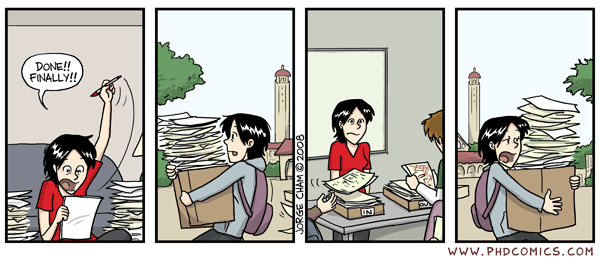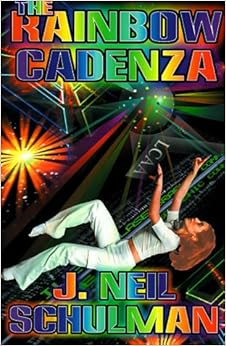This is the latest in a series of (basically) very brief book reviews.
I'm still reading / re-reading a lot of Terry Pratchett. I haven't yet read all of his work, so some of this reading is new to me; and some of his novels I had only read once -- unusual for me. When I like a work, I usually read it nine or ten times -- not in a row, mind you, but over the years. Some books, like
Middlemarch and
True Grit and
Woman of the Iron People, I have read so many times I've lost count.
Anyway! Right now I am halfway through
Thief of Time, which is a Pratchett book I had never read before. It's one in the
DEATH series, and more than that, one of the
DEATH series with Susan Sto Helit's character in it. If you haven't read Pratchett, you might not know how delicious a time I've having.
But trust me. DELICIOUS.
L. Neil Schulman, The Rainbow Cadenza
This one I read thinking I might use it for my Utopian / Dystopian fiction class in the fall.
I won't be; and I wouldn't normally even review it here, because I didn't like it much; but I'm going to write the review, for a specific reason I'll get to in the next review.
Many people do like this book -- or did, anyway; it won the Prometheus Award for Libertarian SF in 1984.
And it's not a terrible book.
Not very good, mind you: it's full of Very Intelligent Men Explaining Things About Life and The Nature of Humanity to our hero(ine), who though she is supposed to be brilliant mostly stands around responding to their lectures with comments like, "I never thought of that," and "I suppose that's true."
It's also, yes, Libertarian. So Government Is Stupid. The premise of the book is that a way to control the gender of children conceived is invented. Or, more specifically, men can control their ability to fertilize eggs such that they will only release male sperm.
According to the conceit of the book, governments of all countries immediately begin providing tax breaks for people who conceive male children; and tax penalties for those who conceive female children.
Why? Well, because, apparently. There is some handwaving about how the male children are necessary for defense, but a little thought shows that this is untrue. And a huge bank of young males is a huge social problem, as every society knows. (To his credit, Schulman does appear to have noticed this.)
Why,
really?
Well, so Schulman can build his story, which is a world where there are seven males for every female.
In this world, Schulman claims, it would just make sense for every young woman to be drafted into the military (the Peace Corps, it's called) at 18 and be forced to have sex -- to be raped -- ten times a day, by ten different men, for the next three years.
Because if men can't have sex with women whenever they want to, then they just riot and commit crimes and die.
Oh, wait. I forgot this part. The men
are rioting and committing crimes. There's this other part of Schulman's world. See, if you're a woman and you refuse to enter the Peace Corps and be raped ten times a day, then you're made a Touchable. Now anyone (usually men, but women take part too) can hunt you at will, and rape you whenever they like, for the rest of your life, also beat you and murder you.
Schulman does not, mind you,
approve of this world he's built. He's a Libertarian. He doesn't think the government has the right to draft anyone -- even women! -- or force anyone to do things against their will for the good of the community. He's just making a
point about how evil it is to draft young men into the military to fight for their country. By writing a novel in which young women are drafted into a military to be raped for their country. And then hunted down and raped and murder when they try to dodge the draft.
Same exact thing, why are you getting upset?
Anyway. The big problem with the novel, besides the endless intrusions of lectures from Very Intelligent Men, and the obsession with scatalogy, was the main character, Joan Darris.
I can see we're supposed to think Joan is a Tough Female Character, but in fact she is both cardboard and contradictory. She endlessly proclaims her Libertarian dicta, how she owes nothing to no one, and will not allow anyone to make claims on her life, blah, blah, blah; and yet then risks both her life and her freedom to raise her mother from the (literal) death.
(What
is this Libertarian obsession with literal immortality?)
The other thing that makes this novel not work for me -- well, two things, really.
(1) I don't believe for a minute that governments would give tax breaks to encourage male births; nor that they would continue to do so when they saw what a crisis it was causing; nor that women would continue to have six or seven male sons for every girl child, as Schulman shows is occurring in the book. Schulman handwaves this as being for the "tax-shelter," but this tells me he cannot have raised a child. No one has kids, or raises kids, for the tax breaks.
Nor do I believe every women would be having nine or ten kids, as Schulman shows them doing here, when they have a free will choice to do otherwise. Taxes or no taxes.
(2) I don't believe for a second that in a world without women -- a world where women are scarce --drafts for rape centers is how things would shake out. Why don't I believe that? Because we have actual evidence for societies where women have been made (artificially) scarce. Not as scarce as Schulman posits, but scarce. We can see what happens in those societies, and we have seen it.
For an instructive comparison, we can look at another book that posits a scarcity of women:
The Book of the Unnamed Midwife
Meg Elison

I came across
this book quite by accident -- it was recommend on someone's blog somewhere, I think? I don't even remember. But thanks to whoever recommended it, because wow, what a great book.
It won the Philip K. Dick Award for 2014. Well-deserved.
It's a post-apocalyptical story (one of my favorite sort). A lethal virus erupts, killing nearly everyone, but -- importantly -- killing many more women than men. Also importantly, it kills most children, and all infants, either before, at, or just after birth.
So. You can see the problem. Almost all the men are dead; but of the ones that are left, many of them will see woman not as equals, not as people, but as objects, as trade goods, and as limited trade goods at that.
For much (but not all) of the novel, we are in the point of view of the Unnamed Midwife herself, who was a Nurse Practitioner in Labor/Delivery in San Francisco, and so saw the plague from the start. Early on, she realized the inevitable results that will follow from her being one of the few surviving woman in the world. Her shrewdness and actual human toughness (as opposed to Joan's bogus toughness) as she copes with the world she encounters is brilliantly handled.
It also doesn't hurt that the writing and world-building is just lovely.
So -- what happens, in a world where women are more rare than diamonds, more precious than gold?
Bad things, as you can imagine. Elison writes about them with clear-eyed honesty. There are no stock villains here; no lectures; and while we do have heroes, they are human heroes. Even the bad guys are human, in that Elison makes it clear to us why they act as they act.
If you want to read a book about a society where women are rare, this is your book.
And don't worry. Parts of it get very dark, but the ending is (sort of, more or less, pretty much) happy.
This is science fiction the way it's meant to be.












